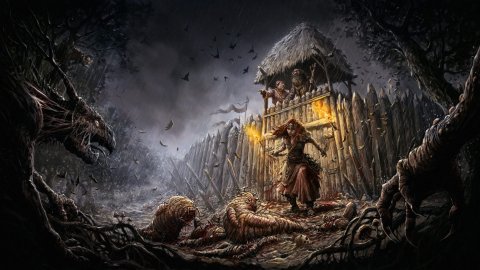Gord, the preview: from the producer of The Witcher, an unexpected strategic survival strategy

Gord, the preview
When a prominent member of a well-known development team leaves the ship there are two cases: either he launches into a project completely detached from his past works to emphasize his renewed independence, or he partially tries to ride the wave of what he did previously . The second case is more frequent - often because it is an excellent way to gain visibility and allows you to work more safely on already traced paths - but it is also risky due to the inevitable comparisons with pre-existing works.The case of Stan Just is a bit more peculiar: a producer somewhat known for having worked on both CD Projekt and 11 Bit Studios, he has now led a small team called Covenant to create a game very different from the works of the notes. software houses just mentioned, yet clearly influenced by their DNA. Gord, this is the name of the video game, is in fact a management strategy with strong survival elements (along the lines of Frostpunk, in fact), but with a dark fantasy setting. We saw it in action, and today we are ready to give you our first impressions.
Mud, death and fantasy
At its core, Gord is clearly a mix of genres. We start with a small community of settlers, sent to explore some inhospitable lands full of dangers, strongly inspired by Slavic mythology. These are endowed with varying abilities and classes, and it is up to the player to keep them alive in order to thrive a small village constantly targeted by rival tribes and by the various monsters that inhabit the area, far from inclined to welcome the people with open arms. newcomers (except to make us a stew).So far everything is normal, but it is immediately clear how the team has chosen to be inspired by many different titles to offer a more complex and interesting experience than the average. The sanity of your colonists, for example, is extremely important, and narrowly escaping death or facing various traumatic experiences can permanently mark them, with annoying penalties à la Darkest Dungeon to say the least (even if we have not been able to enter in detail of these penalties). Not only that, each character has specific abilities and a progression that make him even more important for the survival of the town, yet being (clearly) the "permadeath" an integral part of the experience there is the constant risk of losing an important member of the group for via a simple expedition that went wrong.
The structure of the game, on the other hand, is close to that of modern survival (despite the view here is from the other as in a classic strategy), and allows you to set various values of the starting scenario, to sew the experience around the user's wishes. But be careful: this does not mean that Gord does not have a campaign, and indeed its management is somewhat atypical in that sense.
Goals in the dark
It seems that Gord has a main story and of defined objectives, which lasts about 10 quests. This is then accompanied by an infinitely replayable mode linked to the customizable scenarios we were talking about before, in which it is also possible to set the victory conditions. Not only that, the game map apparently contains torn pages of a text that explain the lore of the game world (conceivably designed for completists and lovers of sought-after narrative backgrounds). There seems to be even a system linked to magic, undoubtedly also related to fighting, although at the moment it seems that the battles are not managed with total control of the units as in a classic strategy, but through partial orders and decisions. Finally, the advancement of one's inhabited center does not depend only on the health of those who live there, but also on the acquisition of new recruits, either through specific events or simply thanks to the reproduction of the settlers (also influenced by the sanity of which we spoke earlier) .The most interesting part of the structure of the campaign, however, concerns the presence of randomly selected quests, and we did not say "selected" instead of "generated" due to a typo ... it seems that the team development has created a long list of highly curated missions, which will be randomly selected in the campaign based on events. This solution should ensure considerable care and variety during progress, without boring procedural fetch quests inserted into the mix for the sole purpose of lengthening the stock (or at least hopefully).
In short, we are clearly facing a title complex, whose validity will depend on the peaceful coexistence of its individual parts and the quality of the systems. All things that at the moment there is unfortunately no way to fully evaluate. Even if the team is small, however, the possibility that they will churn out a small independent hit is very real. All that remains is to wait.
Gord gives the impression of wanting to use highly respectable ingredients. The problem is to mix them in a cocktail that is sufficiently explosive to be able to stand out in the world of hybrid management: titles that are often elaborate to say the least and very difficult to "adjust". However, the dark fantasy setting inspired by Slavic mythology and the ideas behind the project seem very promising, and give us hope despite the fact that the team is small.